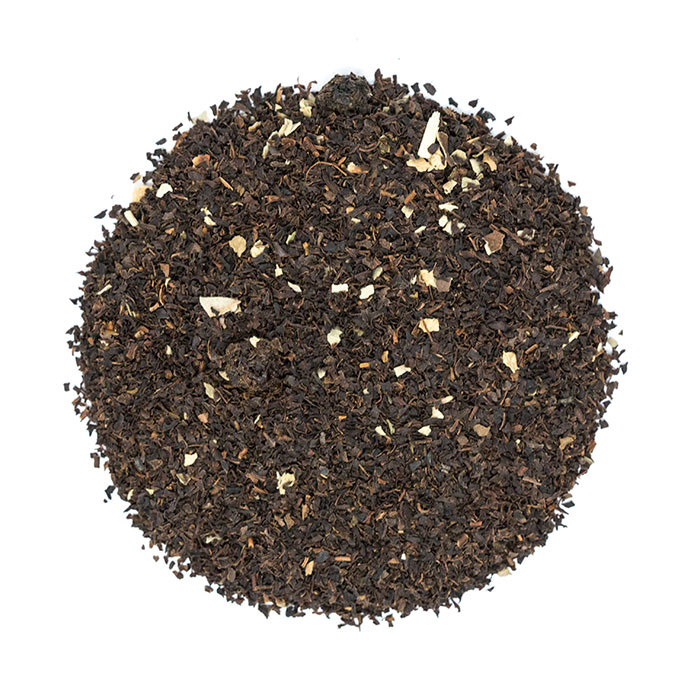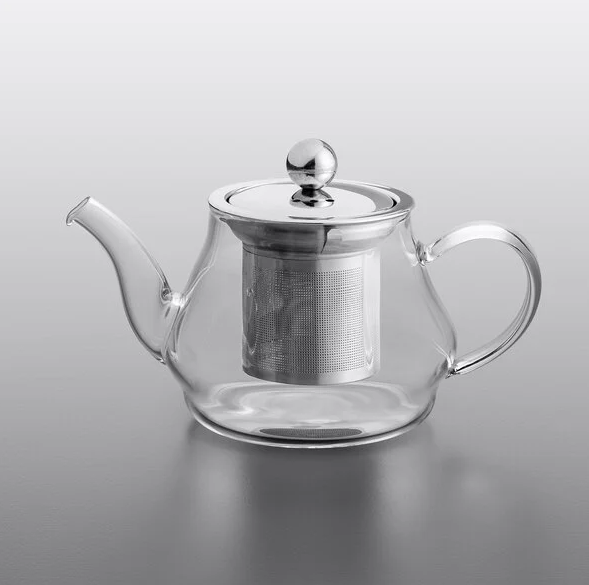Benefits of Drinking Black Currant Tea
For every berry lover, black currants are far from an ordinary fruit. With a deep and rich purple color, delicious and very versatile, these berries are packed with antioxidants and Vitamin C. In fact, they may surpass many other fruits we usually consider the best source of important nutrients. Studies showed that they have twice the amount of potassium than bananas, 4 times more Vitamin C than oranges and 100% more antioxidants than blueberries[1].

What is black currant tea?
When we talk about blackcurrant tea, we usually talk about tea made from berries, rather than leaves. Blackcurrant tea is a dried fruit tea made from small berries grown on a shrub. The Latin name of the shrub is ribes nigrum, and it’s mostly grown across Europe and Asia. Today, Poland is one of the biggest producers of black currants in the world[2]. Pure black currant fruit tea is mostly available in tea bags, with larger freeze-dried fruits often being an ingredient in delicious loose tea blends. The exceptional part is that both dried fruits and leaves of the black currant bush can be used for making tea.Black currant tea benefits
Black currant doesn’t only tastes great, it may offer many great health benefits such as regulating blood pressure, increasing fat oxidation and promoting skin health. It’s rich in Vitamin C and flavonols[3] and has a high antioxidant activity. Similar to acai berries, fruit of the black currant bush contains a pigment anthocyanins, powerful antioxidant that gives dark purple color to fruits and vegetables. Pure black currant tea is caffeine free and suitable for drinking at any time of the day and for people sensitive to caffeine.1. Antioxidant activity
Antioxidant activity in black currants is enhanced because of the high levels of Vitamin C. These berries are great for the overall health and boosting immune system[4]. Interestingly, just like with Camellia sinensis tea, the level of antioxidants will depend on many factors, and terroir is a very important one. Studies showed that berries from countries with cooler climates may have better antioxidant value than others[5].2. Anti-inflammatory
Black currant may help to reduce inflammation which may be very beneficial for those suffering from diabetes, cardiovascular diseases and obesity[6].3. Neuroprotective activity
Including black currants into a diet may have positive benefits on the brain too. So far, studies in rats showed a neuroprotective activity in aging mice.[7]4. Increased fat oxidation
Black currants may have an impact on fat oxidation and promote weight loss. However, just like any other fruits or vegetables, to benefit from black currants in terms of weight loss, physical exercise is a must. Studies showed that black currant berries may increase fat oxidation for 27% during moderate intensity endurance training[8].5. Benefits for the skin
When skin is concerned, fruits and herbs with antioxidants are indispensible. Studies showed that black currants may be very beneficial for the reduction of skin wrinkles[9]. Traditionally, they have been used for treating wounds too, because of its anti inflammatory properties[10].6. Sports performance
There is a reason why black current are some of the most favorite berries of physically active people. Studies showed that they may improve performance, especially in high intensity sports and recovery time in athletes[11].7. Gastrointestinal health
Research showed that blackcurrants may be beneficial for inhibiting bacteria Helicobacter pylori. Interestingly, it’s not the fruit that may help, but the seeds inside the fruit that are eaten together with the fruit[12].8. Anti-cancer potential
Blackcurrants may have a strong anti-cancer potential. Although there are not enough studies to determine if the fruits may help in the actual real-life conditions, in vivo studies in animals showed a great inhibitory effect on some tumors[13].What are the health benefits of blackcurrant leaves?
Drinking black currant leaf tea may provide additional benefits, slightly different that those from the fruits. Unlike the fruits, leaves are not rich in anthocyanins, but still have a high anti oxidative properties because of other compounds. Black currant leaf tea is often used for detox, as it may have diuretic effect and help with minor urinary problems. They also have a high level of antioxidants and anti-inflammatory properties[14].
Black Currant Decaf tea with both dried black currant berries and leaves
How to brew blackcurrant tea
Blackcurrants are often eaten raw, used for making jams and syrups, and dried for making tea. Pure black currant fruit tea is a very popular and widely available tea and tastes delicious even with no sugar or lemon. Blackcurrants are a great ingredient for making tea blends with green and black tea too. Always use freshly boiled spring water for making tea. Although fruit and herbal teas are usually stronger in flavor and may tolerate hard tap water, for the best flavor spring water is the top choice. Use 1-2 teaspoons of loose black currant tea or one tea bag per cup of water. Bring water to a boil and let it cool for a few seconds. Steep the tea for 5-10 minutes. Black currant fruit tea is great for making iced teas with a few fresh mint leaves.Disclaimer: This article is for informational purposes only. It’s not intended to replace medical advice, diagnosis or treatment. Every person is different and may react to different herbs and teas differently. Never use teas or herbs to treat serious medical conditions on your own. Always seek professional medical advice before choosing home remedies.
References:
[1] https://www.sciencedirect.com/science/article/pii/B9780081003299000116 [2] https://www.sciencedirect.com/science/article/pii/B9780081003299000116 [3] https://www.researchgate.net/publication/260086551_A_review_on_bioactive_compounds_in_black_currants_Ribes_nigrum_L_and_their_potential_health-promoting_properties [4] https://www.researchgate.net/publication/225278839_The_health_benefits_of_blackcurrants [5] https://onlinelibrary.wiley.com/doi/full/10.1111/1750-3841.14781#jfds14781-bib-0053 [6] https://www.researchgate.net/publication/332733620_Blackcurrant_Ribes_nigrum_Extract_Exerts_an_Anti-Inflammatory_Action_by_Modulating_Macrophage_Phenotypes [7] https://www.researchgate.net/publication/332733620_Blackcurrant_Ribes_nigrum_Extract_Exerts_an_Anti-Inflammatory_Action_by_Modulating_Macrophage_Phenotypes [8] https://onlinelibrary.wiley.com/doi/full/10.1111/1750-3841.14781#jfds14781-bib-0013 [9] https://onlinelibrary.wiley.com/doi/full/10.1111/1750-3841.14781#jfds14781-bib-0013 [10] https://www.researchgate.net/publication/225278839_The_health_benefits_of_blackcurrants [11] https://onlinelibrary.wiley.com/doi/full/10.1111/1750-3841.14781#jfds14781-bib-0013 [12] https://www.sciencedirect.com/science/article/pii/B9780128053775000187 [13] https://www.researchgate.net/publication/225278839_The_health_benefits_of_blackcurrants [14] https://www.ncbi.nlm.nih.gov/pmc/articles/PMC4931538/
More from:
SLL




Leave a comment